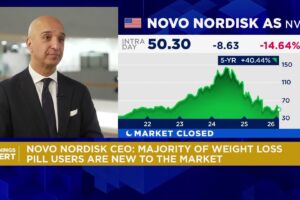<p class="canvas-atom canvas-text Mb(1.0em) Mb(0)–sm Mt(0.8em)–sm" type="text" content="Amazon (NASDAQ: AMZN) has expanded quite a bit from a relatively simple online bookseller. Its cloud computing business, Amazon Web Services, may be worth more than its core retail business. And investors are extremely excited about the prospects of its burgeoning ad business.” data-reactid=”11″>Amazon (NASDAQ: AMZN) has expanded quite a bit from a relatively simple online bookseller. Its cloud computing business, Amazon Web Services, may be worth more than its core retail business. And investors are extremely excited about the prospects of its burgeoning ad business.
<p class="canvas-atom canvas-text Mb(1.0em) Mb(0)–sm Mt(0.8em)–sm" type="text" content="But the market may be undervaluing its core retail business, according to Michael Olson, an analyst at Piper Jaffray. He says the market is valuing Amazon's retail operations more like Walmart‘s (NYSE: WMT) or Costco‘s (NASDAQ: COST) and less like Alibaba‘s (NYSE: BABA) or eBay‘s (NASDAQ: EBAY). Valuing it in line with its online competitors could result in a half-a-trillion dollar difference. Olson sees Amazon’s stock price going to $3,000 per share within two years as the market realizes the value of Amazon’s retail business.” data-reactid=”12″>But the market may be undervaluing its core retail business, according to Michael Olson, an analyst at Piper Jaffray. He says the market is valuing Amazon’s retail operations more like Walmart‘s (NYSE: WMT) or Costco‘s (NASDAQ: COST) and less like Alibaba‘s (NYSE: BABA) or eBay‘s (NASDAQ: EBAY). Valuing it in line with its online competitors could result in a half-a-trillion dollar difference. Olson sees Amazon’s stock price going to $3,000 per share within two years as the market realizes the value of Amazon’s retail business.


Image source: Amazon.
A closer look at the comparables
There’s a massive divide in the market’s valuation of brick-and-mortar retailers and online marketplaces.
|
Company |
Walmart |
Costco |
Alibaba |
eBay |
|---|---|---|---|---|
|
PS Ratio |
0.58 |
0.74 |
7.26 |
3.21 |
Data source: YCharts. Table source: Author.
Olson says the market is valuing Amazon’s retail business at about 0.8 times sales, more like Costco’s and less like eBay’s. And despite Amazon’s investments in physical retail over the last couple of years, it’s increasingly a marketplace business like eBay. Olson suggests Amazon’s retail business deserves a multiple of 2.1 times sales, which would value it at around $760 billion.
One might argue that online competitors are growing faster than brick-and-mortar stalwarts like Walmart or Costco. In fact, Costco and eBay have seen similar revenue growth over the last three years, and Costco grew its top line faster than the online marketplace over the last 12 months. eBay’s gross merchandise volume growth on its marketplace declined 1% in the first quarter. Costco’s sales, by comparison, have increased 8.3% year over year through April 2019, but the market still gives eBay a sales multiple 4 times higher than Costco’s.
And while Amazon’s retail business has slowed in recent years, it’s still growing relatively quickly compared to Costco’s or Walmart’s. Amazon’s first-party online sales increased 10% year over year in the first quarter. Sales at physical stores, a much smaller portion of Amazon’s total sales, increased just 1%. Third-party-seller services grew 20%. The three segments had a blended growth rate of 11%.
Walmart grew sales a whopping 1% year over year in the first quarter. And, as mentioned, even Costco’s sales fall short of Amazon’s growth.
Does Amazon deserve a valuation closer to online competitors?
<p class="canvas-atom canvas-text Mb(1.0em) Mb(0)–sm Mt(0.8em)–sm" type="text" content="Even though an increasing majority of Amazon's online sales are coming from third-party sellers, that doesn’t mean its retail business deserves the same premium as eBay or Alibaba. Those two companies get the vast majority of their revenue from their marketplace businesses.” data-reactid=”35″>Even though an increasing majority of Amazon’s online sales are coming from third-party sellers, that doesn’t mean its retail business deserves the same premium as eBay or Alibaba. Those two companies get the vast majority of their revenue from their marketplace businesses.
Moreover, Amazon’s marketplace business holds much more overhead than those of eBay or Alibaba. Amazon is spending billions building out warehouses, fulfillment centers, and logistics capabilities to get orders to customers’ homes more quickly. eBay and Alibaba merely connect buyers and sellers.
<p class="canvas-atom canvas-text Mb(1.0em) Mb(0)–sm Mt(0.8em)–sm" type="text" content="Amazon continues to build out its fulfillment capabilities, and with pressure from brick-and-mortar competitors, it’s likely to continue pushing forward to speed up delivery and take more of its logistics operations into its own hands. That ultimately gives Amazon a wider moat and third-party sellers more reasons to use Amazon’s seller services, but it costs a lot in the meantime.” data-reactid=”37″>Amazon continues to build out its fulfillment capabilities, and with pressure from brick-and-mortar competitors, it’s likely to continue pushing forward to speed up delivery and take more of its logistics operations into its own hands. That ultimately gives Amazon a wider moat and third-party sellers more reasons to use Amazon’s seller services, but it costs a lot in the meantime.
Given the costs involved in Amazon’s third-party marketplace, it doesn’t deserve a multiple quite as high as online-only competitors like eBay. That said, it also doesn’t deserve a multiple as low as Walmart’s or Costco’s. Olson’s 2.1-times sales multiple seems to strike a happy medium between the two, and somehow makes his $3,000 stock price valuation for 2021 look reasonable.
<p class="canvas-atom canvas-text Mb(1.0em) Mb(0)–sm Mt(0.8em)–sm" type="text" content=" More From The Motley Fool ” data-reactid=”43″> More From The Motley Fool
<p class="canvas-atom canvas-text Mb(1.0em) Mb(0)–sm Mt(0.8em)–sm" type="text" content="John Mackey, CEO of Whole Foods Market, an Amazon subsidiary, is a member of The Motley Fool’s board of directors. Adam Levy owns shares of Amazon. The Motley Fool owns shares of and recommends Amazon. The Motley Fool recommends Costco Wholesale and eBay. The Motley Fool has a disclosure policy.” data-reactid=”51″>John Mackey, CEO of Whole Foods Market, an Amazon subsidiary, is a member of The Motley Fool’s board of directors. Adam Levy owns shares of Amazon. The Motley Fool owns shares of and recommends Amazon. The Motley Fool recommends Costco Wholesale and eBay. The Motley Fool has a disclosure policy.








